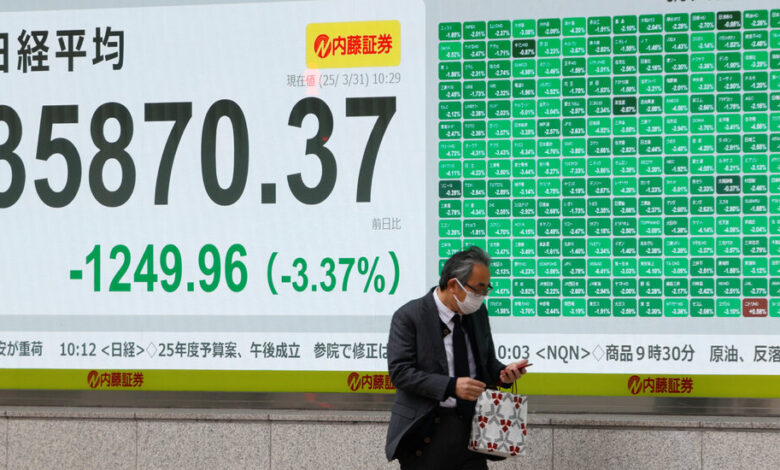Stocks Sink as Trump’s Tariff Threats Weigh on Confidence

Global stock markets experienced a significant downturn on Monday as investors prepared for a volatile week ahead due to the anticipated announcement of additional tariffs by President Trump on the United States’ major trading partners.
Since assuming office just over two months ago, President Trump has kept both investors and businesses on edge with the unpredictable implementation of his “America First” trade policy. His approach has involved threats, actual imposition, and sometimes temporary suspension of new tariffs on imported goods.
Stocks in Japan and Taiwan plummeted by more than 4 percent, while South Korean shares saw a 3 percent decline. Japan’s Nikkei 225 index entered a correction phase, dropping 12 percent from its peak in late December. Technology firms such as Taiwan Semiconductor Manufacturing Company, SK Hynix, Samsung, and Tokyo Electron were particularly hard hit.
China experienced more moderate losses, with Hong Kong stocks falling over 1 percent and mainland Chinese stocks dipping by around 0.5 percent. A report indicating the continued growth of China’s export-led industrial sector provided some support to mainland stocks despite the initial tariffs imposed by President Trump.
European markets opened with a decline, with the Stoxx 600 index decreasing by approximately 1 percent. German automakers, who face significant exposure to U.S. tariffs, extended their recent losses, with Volkswagen, Europe’s largest carmaker, dropping by nearly 2 percent in Frankfurt.
Futures for the S&P 500 index showed a decrease, reflecting investor concerns. Last Friday, the S&P 500 fell by 2 percent amid worries that President Trump’s tariffs could lead to increased inflation and reduced consumer confidence, marking the fifth weekly decline in the past six weeks.
President Trump’s tariff strategy aims to raise import costs, particularly in industries like automobiles, with the belief that such trade barriers will encourage investment and innovation within the United States. The President has also utilized tariffs as leverage for geopolitical negotiations, causing further unease among investors with his disregard for market repercussions and potential price increases for American consumers.
Over the weekend, President Trump escalated tensions by threatening secondary sanctions on Russia unless they engage in talks to resolve the conflict in Ukraine. These tactics mirror similar sanctions imposed on Venezuela, with the President warning of a 25 percent tariff on imports for countries purchasing Venezuelan oil.
The looming implementation of a 25 percent tariff on imported cars and car parts, along with the unresolved tariffs on Mexico and Canada, has added to the uncertainty. Additionally, there are concerns about potential retaliatory tariffs from other nations.
Investors are also awaiting the release of the U.S. jobs market report on Friday, which will offer insight into how the Trump administration’s policies are impacting the economy.
Reporting contributed by Keith Bradsher.





